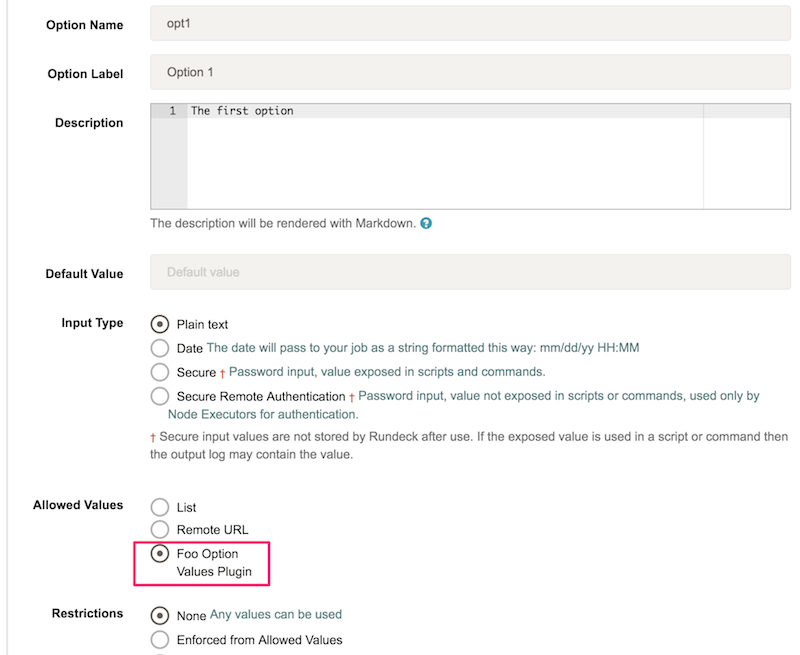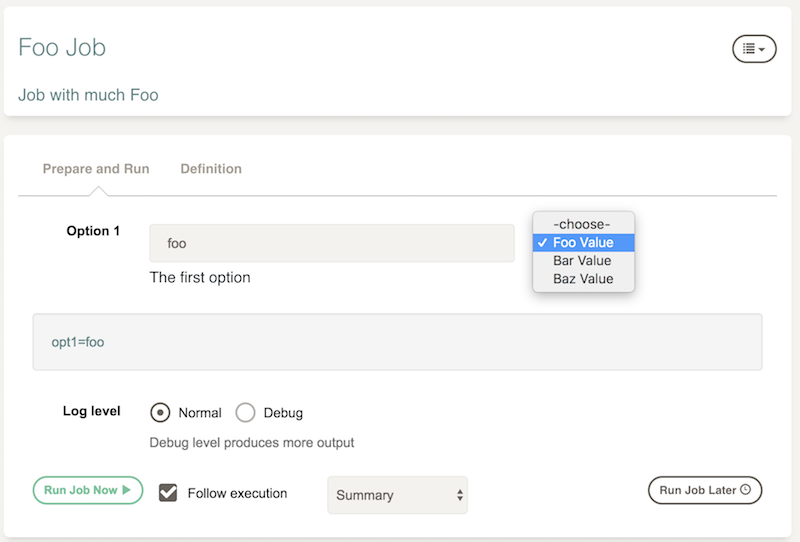Option Values Plugins
Option Values Plugins
About
Option values plugins allow you to provide custom values to your job options. Instead of creating a web service to provide the values, or supplying a static list of options, you can use an option values plugin to provide valid values for an option. If you configure an option values plugin for your job, the plugin will run and provide the values to the UI when you are preparing the job for execution.
To enable this plugin type in your Rundeck installation add the following to your rundeck-config.properties:
rundeck.feature.option-values-plugin.enabled=true
Use
Create an option values plugin and install it like other Rundeck plugins. When you are creating a job, create a new option with the option type: Text. Scroll down to the Allowed Values section and you will see your option values plugin listed.

Select your option values plugin. Finish configuring your job.
When you go to execute your job you will see the values provided by your plugin as the allowable values for your option.

Select the value then run your Job.
Configuring
To configure your plugin you can add configuration values to either the framework or project scope.
Framework scope property definition in framework.properties
framework.plugin.OptionValues.[your_plugin_name].[property]=value
Project scope property definition in project.properties
project.plugin.OptionValues.[your_plugin_name].[property]=value
Java Plugin Type
package com.plugin.optionvalue;
import com.dtolabs.rundeck.core.plugins.Plugin;
import com.dtolabs.rundeck.plugins.descriptions.PluginDescription;
import com.dtolabs.rundeck.plugins.option.OptionValue;
import com.dtolabs.rundeck.plugins.option.OptionValuesPlugin;
import java.util.ArrayList;
import java.util.List;
import java.util.Map;
@Plugin(service="OptionValues", name="foo-option-values")
@PluginDescription(title="Foo Option Values", description="Option values java plugin")
public class FooOptionValues implements OptionValuesPlugin {
@Override
public List<OptionValue> getOptionValues(final Map config) {
List<OptionValue> options = new ArrayList<>();
options.add(new StandardOptionValue("Alpha","alpha"));
options.add(new StandardOptionValue("Beta","beta"));
options.add(new StandardOptionValue("Gamma","gamma"));
return options;
}
class StandardOptionValue implements OptionValue {
private String name;
private String value;
StandardOptionValue(String name, String value) {
this.name = name;
this.value = value;
}
@Override
public String getName() {
return name;
}
@Override
public String getValue() {
return value;
}
}
}
Groovy Plugin Type
import com.dtolabs.rundeck.plugins.option.OptionValuesPlugin
rundeckPlugin(OptionValuesPlugin) {
title="Foo Option Values Plugin"
description="Option Values Plugin"
configuration {
cfg1 title: "Config Property", description: "A configuration property"
}
getOptionValues { config ->
def options = []
options.add([name:"Foo Value",value:"foo"])
options.add([name:"Bar Value",value:"bar"])
options.add([name:"Baz Value",value:"baz"])
return options
}
}
Script Plugin Type
Options will be picked up from the script between the markers ==START_OPTIONS== and ==END_OPTIONS==. Echo your options in the format of label:value. The label will appear in the dropdown list, and the associated value will be used as the value passed to the option.
#!/usr/bin/env bash
echo "==START_OPTIONS=="
echo "opt1:First Option"
echo "opt2:Second Option"
echo "==END_OPTIONS=="
Automated values in Option Values plugins
The subprocess spawn by Rundeck when populating the Option values does uses the following environment variables:
RD_PLUGIN_SCRIPTFILE=/my/rundeck/libext/cache/optionproviderplugin/script.sh
RD_PLUGIN_FILE=/my/rundeck/libext/optionproviderplugin
PWD=/my/rundeck
RD_PLUGIN_BASE=/my/rundeck/libext/cache/optionproviderplugin
SHLVL=1
_=/usr/bin/env
In order to use additional environment variables and programs (like rd-cli) to provide automated values to the option, some scripting will be necessary within the custom plugin code to achieve this.
Example
#!/usr/bin/env bash
source ~/rd-cli.conf
echo "==START_OPTIONS=="
rd projects list -% "Random Project:%name" | shuf | head -1
echo "==END_OPTIONS=="
